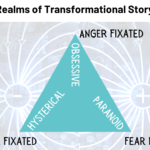
The act of Storytelling is ultimately just a manipulation of Intent.
Intent, unlike intentions, is the funneling of energy beyond the realm of the mind.
For example, if you were to witness someone telling a story in an incomprehensible foreign language, the intent they’re able to manipulate is easier to perceive because we don’t get caught up in the words.
If we cannot See Intent, we do not know what we are manipulating.
When an audience participates in a Storytelling experience, they are trusting that the storyteller has done their homework and understands what they are conveying.
Audiences are playing the more receptive role, while the storyteller is acting more as the provider.
This more receptive role is more innocent and naive. This means that they don’t know what they don’t know. And it’s not their job.
They don’t know if they’re being roped into the unresolved issues from the author’s childhood.
They don’t know if the author is using their own self-pity to appeal to their emotional body.
They don’t know if the author’s usage of Intent is conscious or unconscious, and so it’s become a rare and “lucky” find to come across truly great stories.
This is also why producers are constantly on the lookout for high-quality stories because typically they are completely contrived as they are coming from unconscious agendas.
So, the Storyweaving revolution was just begging to be born. It could change the entertainment industry completely.
Storyweaving is nurturing the nurturers, birthing the birthers, and cultivating the cultivators.
This is big.
Joshua






No comment yet, add your voice below!